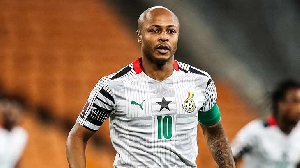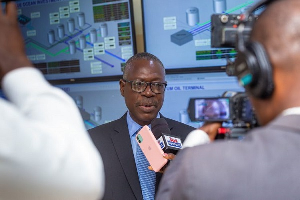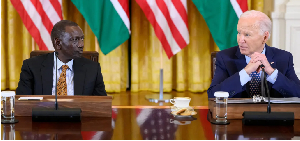- Home - News
- TWI News | TV
- Polls
- Year In Review
- News Archive
- Crime & Punishment
- Politics
- Regional
- Editorial
- Health
- Ghanaians Abroad
- Tabloid
- Africa
- Religion
- Election 2020
- Coronavirus
- News Videos | TV
- Photo Archives
- News Headlines
- Press Release
General News of Friday, 16 February 2001
Source: -
Kufuor's sessional address to Parliament - The full text
Mr. Speaker, Honourable members of Parliament. Five weeks ago, on 7th January 2001, I appeared before you to swear the great oath to assume the high office of President of the Republic.
Since then, I have been occupied with assembling the team which will assist me in the discharge of my mandate. With your cooperation, that task is now substantially complete.
I must express on behalf of the Ghanaian people and on my own behalf, my gratitude to Honourable members for the business-like and transparent manner in which you conducted the approval process of my nominees for ministerial appointment.
Mr. Speaker, the Constitution of the Republic demands that, at the beginning of each session of Parliament and before a dissolution of Parliament, the President delivers to the House, a message on the state of the nation.
It is my privilege and honour to deliver today, this, the first message of my tenure of office on the state of the nation.
Last December, that is on the 7th and 28th December 2000, the good people of this country made a decision. They chose, after 43 years of national independence to use the ballot box to effect a change of government, and to replace one democratically elected government with another.
The world stands in admiration of our achievement, and this should encourage us in our path of deepening and consolidating democracy under a regime of respect for human rights and the rule of law.
The expectations of our people are very high, and justifiably so. The conditions under which the majority live are intolerable and we must succeed in improving the quality of their lives; for failure will forever undermine our people's support for democratic governance.
The legacy we have inherited on the economic front is daunting. Mismanagement, mass unemployment, low wages, high cost of living, a rapidly depreciating currency, a colossal national debt, high dependency on foreign aid as well as declining educational and health opportunities, extensive corruption in public life, a cowed and demoralised private sector, hopelessness and despair - this is the legacy of the last two decades.
The positive change we have embraced is about a new vision of Ghana. This vision was eloquently articulated by an eminent Ghanaian who was the founder of the political tradition which has given birth to the NPP.
"Our party's policy" he said, "is to liberate the energies of the people for the growth of a property-owning democracy in this land, with right to life, freedom and justice as the principles to which the government and the laws should be dedicated in order specifically to enrich life, property and liberty of each and every citizen."
It has been some forty years since these memorable words were first uttered by the late Dr.J B Danquah and yet, the sentiments are as fresh and relevant to our needs today as they were then, and that, Mr.Speaker, Honourable Members, is what the people have chosen.
It has taken us a long and sometimes tortuous route, but by this historic vote, we, as a nation have made that choice. We have tried other options and we have now stated clearly what we want.
It is now up to those of us who have been elected to serve, to translate that dream into reality. We need though, to pause awhile, and take a proper look and define exactly where we are at the start of this historic journey.
We have a constitution and there is an overwhelming consensus among our people that democratic, constitutional rule is, and should be, the form of governance in our country.
It requires respect for the separation of powers between the executive, the legislature and the judiciary as provided for under the constitution.
Mr. Speaker, much as I would wish not to tread on the prerogatives of either the legislature or the judiciary, I am of the firm conviction that good governance can only be attained if the three arms of government cooperate in the national interest.
We must reinforce the institution of the Presidency, support the independence and effectiveness of the judiciary and enlarge the capacity of Parliament to deliver good governance.
The edifice, known locally as Job 600 stands, in its uncompleted state as an eye sore and a disgrace to us all. This is meant to be the offices of our Parliamentarians and their support staff.
The World Bank, at the request of parliament provided an amount of 25 million dollars to support the Completion of the project. But we now find that part of the money meant for the project was misapplied causing the delay in the completion of the work.
The Honourable Members therefore, continue to be deprived of offices and support services, required to make them effective. We shall finish the refurbishment of "Job 600" and ensure our MPS are properly equipped administratively to serve the nation effectively.
But even more alarming is the physical state of the Presidency. The Castle is in a state of gloomy disrepair. Flagstaff House, the home of our first President Dr. Kwame Nkrumah, has been abandoned to rats and looks like the ruins of a bygone era.
The President has no official residence and there are no offices for the Presidency. Ironically, this is an era of executive Presidential government.
Ghana deserves better and we shall take steps to ensure that the presidency of Ghana is 'properly housed as the hub of good governance.
Last but not least, it is an open secret that the Judiciary, dubbed under the current constitutional dispensation as the "Oracle of the Constitution" is only a pale shadow of what it should be. My government will support the continued modernization of the process of administration of justice, enabling the judiciary to be fearless and independent. This is the anchor of the Rule of Law.
The greatest challenge that faces our young democracy is the fragility of the institutions that are needed to uphold the constitutional structure. We dare not therefore, postpone the proper equipment of the main organs of state. This will help defuse tensions and inspire confidence in our institutions.
In this light, I must use this occasion to make the clear affirmation that those in opposition are NOT enemies of the state and that it is not only legal but also acceptable to belong to parties other than those of the government party.
Unfortunately, for far too long, things that are legal in theory have been treated in practice as though they were illegal. Those in positions of authority have sought to use fear as an instrument of power.
Hence, the very seat of government, the Castle, conjures images of oppression and fear in the minds of our people.
My Government intends to remove fear from our politics and demystify the business of government, making public officials servants of the public, instead of the demi-gods they more often than not, pretended to be.
Mr. Speaker, we intend to promulgate a Code of Conduct by which all members of the executive branch of government will have to abide; and as I have indicated, I shall lead by example and ensure that the Code is strictly implemented to the letter.
This should give to our people and the international community the added confidence in our ability to turn the country around with honour and decency.
Public service is a noble calling, not intended to be an avenue for plunder and loot. To be able to tackle the many problems that we face, the country will need to pull together and my government will make good in its manifesto commitment to reconcile our people.
The National Reconciliation Committee, promised in our manifesto, will be established to provide a forum. Those who are aggrieved can have the opportunity to air their grievances in order to promote the goal of national reconciliation.
To this end they shall accelerate the process of restoring confiscated assets to their owners. It is time to bring this whole chapter of confiscation to an end. I have instructed the Attorney General to bring quickly for consideration by the Cabinet and myself guidelines for the rapid de-confiscation of assets.
I wish to reiterate, Mr. Speaker that my government is committed to national unity because we need to move forward as a united people. But this does not mean that we should forget about the many abuses that have taken place and we should not give the impression that we endorse a culture of impunity.
Those who have been wronged need to be acknowledged, and where it is beyond human capability that those wrongs can be reversed in the loss of dear ones, for example, the least we can do is to publicly apologise and help in whatever way we can, with their rehabilitation.
It is important to state that where criminal acts have been committed especially after the coming into effect of the constitution, it will be irresponsible to allow such people to escape the consequences of their actions under the guise of the "no witch hunt" policy.
That way lies the perpetuation of the culture of impunity and we owe it to the People of Ghana to demonstrate that those who break the law will he brought to book.
Mr. Speaker, whether we succeed, or fail, depends on the people believing that their government is fair and behaves in the even-handed manner.
All citizens are entitled to a fair share in the economic opportunities that open up in this country.
From now On, people will no longer need to produce membership cards in this or that political Party in order to enjoy the benefits of public policy.
It is therefore imperative that the rule of law should be the guiding principle in all our dealings and that no-one is seen to be above the law. When everybody feels safe under the law, our focus on creating wealth and eradicating poverty in our nation will move apace and gather irreversible momentum.
The past year has been a Poor one for our country economically. We were well aware of that before our inauguration into office. But discovering the depth and extent of our financial plight, since our inauguration on 7th January, has been as shocking, as it has been sobering.
Provisional figures indicate that the growth of real gross domestic product, which gives an indication of the performance of the economy, in the year 2000, was 3.7 percent which is far lower than the projected 5% percent in last year's budget Statement.
The total debt stock of our country stood at 41.1 trillion cedis at the end of December 2000. Out of this amount, 31.7 trillion or US $5.8 billion was external and 9.4 trillion cedis or US $1.7 billion, was domestic.
Clearly, the institutions that should have acted as watchdogs to confront the problems of inefficiency and corruption as they arose, failed catastrophically.
Thus it is imperative that our first actions must be to, re-establish the authority of our institutions and thereby make expenditure transparent and well-managed.
The Minister of Finance will address fully in his budget statement, the various measures we shall be taking to tackle the weaknesses in our economy, but I can say now that we shall all have to take some very hard decisions.
The debilitating effects of excessive debt on our economy are well known and we are fully committed to reviewing and examining all potential instruments for debt management, including accessing the Highly Indebted Poor Countries debt relief initiative.
My government shall, by the end of next month, issue a definitive policy statement regarding the HIPC debt relief initiative. We shall he guided by what will serve the best interest of Ghana.
We cannot ignore the precarious state of our currency, the Cedi. My government is strongly committed to membership in any currency union that ensures a more stable currency and lower rates of inflation.
To be able to join any currency union, we need to impose on ourselves and scrupulously observe a strict fiscal discipline, and this we shall do immediately in the hope that we shall meet the stringent criteria normally required before the end of my first term in office.
A major economic problem we must urgently address now is the pricing of petroleum products. This problem should have been dealt with by the previous government, which for reasons of political expediency, chose not to do so.
The options open to us are either to continue as we have been doing, and the country grinds to a complete halt, or we bite the bullet and charge realistic prices for petroleum products. We will now tackle this problem head on.
We will take appropriate action to move towards full cost recovery and implement a plan to reduce the stock of the Tema Oil Refinery debt over time. Details of the thrust of this policy plan as well as specific details of our policies will be spelt out shortly.
It was a tragic error of policy when Ghana dismantled her system of mass public transportation. A part of my government's answer to mitigating the impact of rising petroleum prices on the family budgets of the working population is to restore the urban bus and other mass transportation systems, which will also help to economise on Ghana's use of imported petroleum.
We will aggressively set out to tackle the huge budget deficit with the aim of balancing the budget by the end of this government's first term in office. We will impose a strict regimen of self-discipline and frugality on the government and its agencies.
My government believes that the private sector must be the main engine of growth of the national economy. The partnership of the private sector with the public sector is at the heart of our economic strategy.
I have appointed a minister specifically responsible for private sector development whose duty it is to take action to remove bureaucratic obstacles to entrepreneurship and free enterprise.
Small and medium scale entrepreneurs will be encouraged with government guaranteed credits to help them. Our aim is to make our private sector more dynamic, innovative and vibrant in order to be able to compete within the global market.
I have promised the Nation a golden age of business and I shall deliver on that promise. To achieve this, we shall pursue transparent policies, and create the necessary framework for the protection of property rights and business contracts.
As promised in our manifesto, my government will review and broaden the coverage of the Investment Promotion Act. The Ghana Investment Promotion Centre will become a one stop agency for Ghanaians, overseas Ghanaians and foreign investors.
It is unacceptable for Ghana which has all that it takes to produce sufficient food to feed her people, and export to less endowed countries, to spend massive foreign exchange to import from other countries -including those in the desert -food we can grow here.
My government will work hard to reverse the situation. We shall grow what we eat, eat what we can, and sell what we cannot. Indeed, our ultimate objective is that Ghana becomes a leading Agro-based industrial country in Africa by the year 2010.
We shall start laying the foundations from this year by increasing production of our staples, like rice, maize, roots and tubers. Obstacles arising from inappropriate land tenure in some areas and poor land utilisation policies in the country as a whole have long bedevilled investment in both agricultural and industrial production.
This government will embark on the reform of Land Laws and Administration as promised in our manifesto, to make it easier for would be entrepreneurs to acquire land for their businesses.
This necessary reform of our land laws will be sensitive to the rights of local communities and traditional authorities.
If our plans to revive the economy are to have any chance of success, we must, at the same time, invest in our young people and my government believes that education holds the key.
Our educational system used to be famous across Africa, and justly so. Schools like Achimota and dare I say it, my own Prempeh College, our university at Legon to mention but a few, were the envy of our neighbours.
An early commitment to universal primary education bore fruit, far beyond the school gates. But we are no longer able to produce, such results due mainly to lack of resources and the under-valuing of education as a whole and the teaching profession in particular.
Equal access to educational opportunities is, in the long run, the principal instrument or achieving social justice. The present imbalance in volume and quality of the educational facilities available to urban against the rural population is creating a social divide which our government will act decisively to reverse.
The recent trends in educational financing also pose the danger that secondary education will be priced completely out of the reach of the children of ordinary Ghanaians. This is equally unacceptable to my government and we shall put measures in place to reverse this.
If we are to attract foreign investment, we must have a skilled workforce which can compete in the global market. That means ensuring that we keep pace with evolving technology so that we can work at the cutting edge.
Our young people will be encouraged to direct their energies into useful activities. Sport has always provided an outlet for even the most disadvantaged to excel. My government will be enthusiastic in its support of all sporting activities.
You have heard of the much talked about "digital divide" between Africa and the rest of the world. There is a huge opportunity to stimulate our economy through embracing the technological change that is sweeping the globe.
We have seen, using mobile phones alone, how technology can leap-frog traditional learning curves. E-Commerce via the internet is just one of the elements that can and must play a role in our arsenal of economic rejuvenation.
That can only happen when we invest in our teachers by constantly upgrading their skills.
But revival in this area starts from a child's first day at school. My government has therefore appointed a minister of state with special responsibility for primary, secondary and girl-child education to ensure that maximum attention is paid to getting these early years in education right.
My government's commitment to the welfare and empowerment of women goes beyond our concern for the girl-child. The creation of the Women's Ministry is the first instalment of our long-term strategy to raise the profile of women in the economy and in all aspects of our national life.
Mr. Speaker, significant improvements have been made in the health sector leading to some achievements in several areas of public health delivery including immunisation coverage and reduction in maternal and child mortality.
In health attainment however, Ghana occupies the 149th position amongst the 191countries compared in the World Health Organisation's Report of the year 2000. There is still a predominance of infectious diseases. Malaria, diarrhoea, acute respiratory infections, tuberculosis and increasingly now, HIV/AIDS are the leading causes of morbidity and mortality nationwide.
Guinea worm infestations which declined substantially have in the past four years become a major health problem and indeed today, Ghana is number one on the list of affected countries. We are taking measures to fully eradicate it by the middle of next year.
In the matter of health financing, we are committed and are working feverishly towards abolishing the "Cash and Carry" system and will in its place, establish a health insurance scheme.
In the next few mouths, Government will establish modalities for the determination of a smooth transition from the "Cash and Carry" system to an alternative Health Insurance Scheme. We have serious problems with our human resources in the health sector.
In Cape Coast, an intensive care unit - three beds, each with a state of the art ventilator unit - gathers dust. Six dialysis machines, enough to handle the needs of half the country's emergency kidney patients, lie idle. There are patients for these beds, but no nurses to serve them.
The motivation and retention of our health personnel shall be a major priority.
Mr. Speaker, we should all be embarrassed that our continent still produces so many refugees and is the theatre of so many wars.
There are however, some areas that give us all reason to hope. The Peaceful elections and transfer of power here in Ghana are causes for hope and it places a particular responsibility on us to make sure we hold on to the stability that we have.
There are those who will want to disturb the peace but we shall not let them kill our dream.
To keep this dream alive, we propose to extend and strengthen democratic institutions at the local level. We aim to make District Chief Executives truly accountable to the district electorate and also deepen the decentralisation process.
There is a lot of hard work ahead of all of us before we attain that forty-year old goal of building a property-owning democracy. It is a goal worth striving for. More people will feel they have a stake that they will defend.
Already, the fact of having voted out one government and voted in another has so empowered many people they will not easily allow any adventurer to rob them of their elected government. In much the same way, increased prosperity will engender a greater sense of ownership and a determination to protect both the individual and communal properties.
My government will create the necessary atmosphere to stimulate the entrepreneurial spirit that abounds among our people. Set free, we shall, as another famous Ghanaian stated, soar like eagles, set free, our people will serve as the watchdogs over their government.
Set free, I have no doubt our media will play their honourable role with a heightened sense of responsibility. We shall expand the boundaries of freedom by repealing the laws that criminalize speech and expression. Mr. Speaker, the Criminal Libel Law will be repealed as a mark of confidence in a responsible media.
We do not expect that Ghanaians will suddenly all be transformed into saints, there will still be miscreants amongst us. The Police, who are charged with upholding law and order, will therefore be strengthened to protect the ordinary citizen and bring the wrong doers to book.
Already the Police have stepped up their patrols in our cities, bringing crime and armed robberies under greater control. In the past twenty years, Police numbers have been allowed to sink to dangerous levels, and their training has not been equal to the needs of a democracy.
We shall empower the service to enable them to discharge their responsibilities to police a free society.
Whenever specific problems are beyond their immediate capacity, we shall not hesitate to seek foreign assistance as we have done in our determination to unmask the authors of the dastardly serial killings that have plagued our womenfolk these last few years.
Nothing will be spared to bring the perpetrators of these heinous crimes to book. That is my personal pledge.
Our concern about improving the capability of the police service extends to all agencies of the security services. Our goal is to build security services that are professional, well-trained, well-equipped, politically neutral and capable of protecting citizens of a free society and above all, loyal to the state.
Our Armed Forces will also receive urgent attention. We will rehabilitate their barracks which have been neglected over a long period of time. Work on this project will start this year.
We are strong believers in the abilities of an individual to help her or himself while building a prosperous state; but we recognize that not everybody has that capability.
It is the responsibility of the state, the government and the community to take care of those who cannot stand on their own two feet. It is the mark of a civilized people to help the weak and the disadvantaged.
That eminent Ghanaian and great political leader, K.A. Busia, admonished us many years ago that we should be each other's keeper, an admonition which still rings down the ages in our ears.
Mr. Speaker, during the campaign, I promised the people that, given their mandate, I would assemble a team of capable and competent persons to assist me in implementing the programmes of our manifesto.
With your cooperation here in Parliament, I believe that I have done so to the satisfaction of the Nation.
Mr. Speaker, we have an exciting time ahead of us. I urge all well-meaning Ghanaians to join us in moving towards the realization of our common dream of peace, progress and prosperity. It is within our grasp.
May God help us all. Thank you.










